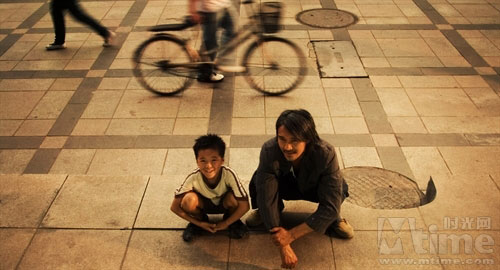
Stephen Chow and Xu Jiao in a scene from Chow's latest film "CJ7." [File Photo: mtime.com]
Stephen Chow's latest film "CJ7" in my initial impression, was not "CJ7" but really a big question mark - Has Chow, the spokesman for the now widely-accepted mo lei tau (Cantonese term for nonsensical humor) genre, been fed up with his trademark style?
For almost two decades, Stephen Chow has been a synonym for mo lei tau, which first brought him to fame in 1990 with "All for the Winner," and later cemented his role-model role for fresh comedians in 1995 with "A Chinese Odyssey." And finally with the 2004 hit "Kung Fu Hustle," he earned the Golden Horse best director honor and several Western awards. (For the same film he was also nominated for best actor at the Hong Kong Film Awards.) "Kung Fu Hustle," which is Chow's last directing/acting film before "CJ7," grossed a total of HK$60 million, the highest in Hong Kong's history. All these facts make Chow, if not the trailblazer for mo lei tau, at least the one who embedded it in the pop culture.
Within such a context, "CJ7," with much less mo lei tau residue, is a weak offer. How can a tear-drawing story involving a school boy, his poor father and an alien dog live up to fans' years-long expectation?
The film opened on January 30, and with Chow's star power it is still attracting movie-goers to the theaters. But many viewers have voiced their disappointment, saying the film is too serious to be a Chow's film.
"CJ7" however, serious or mo lei tau, or neither, is so far Chow's best offering, in terms of letting us see who he really is off the screen.
In the film, Chow cannot afford a toy for his son, so he goes to find one at the garbage dump. What he has found, CJ7, turns out to be an alien dog that possesses the power to fix destroyed things.
Chow told the Southern Metropolis Daily in an interview that the film was partially inspired by an incident in his own childhood, when his poor parents got into a quarrel right in the street when he asked for a toy. His father wanted to buy a toy for the little Chow; but his mother insisted the family could not afford it.
Chow says his entire childhood is mirrored in "CJ7." Indeed, many of its scenes have a shade of his early days. Born in 1962 in Hong Kong, Chow grew up in a shabby neighborhood. (In the film, the father and the son live in a dilapidated house.) When Chow was seven, his parents filed a divorce and since then he seldom saw his father; (In "CJ7," Chow is a single father.) A stranger to paternal love, Chow has always been craving to do something to regain what was lost. ("CJ7" was shot in Ningbo, an eastern coastal city where Chow's father once lived. A deliberate attempt by Chow.) And finally, a huge fan of extra-terrestrial life -- he has for several times publicly rhapsodized about witnessing UFOs -- he created a super-powerful alien to mend ruined things in the film, and the broken family in his memory.
For all these reasons and also that I admire Stephen Chow not for his mo lei tau aptitude but for who he is, I give "CJ7" a thumbs-up.
(CRI March 5, 2008)